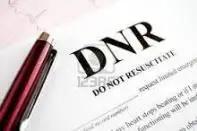Question: My dad signed a DNR when he was recently admitted to the hospital. Will this be effective when he is discharged back to his home?
Answer: No, a hospital Do Not Resuscitate Order (“DNR”) will not be honored in a non-hospital setting. DNR orders refer only to the use of cardiopulmonary resuscitation, commonly known as CPR, to regain a heartbeat or assist in breathing. Any other types of interventions are not governed by the DNR order. The patient can sign the DNR order with the doctor or, if the patient does not have capacity as determined by two doctors, a surrogate decision maker can give the order. There is a hierarchy to determine who is a person eligible to be the surrogate. In order, the list is as follows: a guardian, spouse, children, parent, adult sibling, or close friend. A surrogate signing the DNR order needs one adult witness. If giving oral consent, the surrogate must give consent to two adult witnesses, one of whom is a doctor at the hospital. The doctor issuing the DNR order must use the New York State Department of Health form in order for the DNR to be valid.
What Is a Non-Hospital DNR?
However, there is a Non-Hospital DNR order that your father can sign. This order is also issued by a doctor on a New York State Department of Health form. Consent from the patient to the doctor can be spoken, including by phone, or done in writing with two witnesses. If your father has signed a living will in the past that states he does not wish to have extraordinary measures taken on his behalf, this can serve as his consent. After the DNR order is written by the doctor, your father will wear a bracelet that shows that he has signed such an order; this will be the indication to emergency medical personnel that CPR should not be administered. The non-hospital DNR will be in effect if your father is taken to a hospital unless the doctor cancels the order for some reason, such as by direction of the patient.
Are DNR Orders Permanent?
DNR orders are not permanent in that they must be reviewed by a doctor at certain time intervals. While your father was in the hospital, the DNR order should have been reviewed every 7 days but his non-hospital DNR will have to be reviewed at each doctor’s visit. If he is not seeing the doctor frequently, he must be sure to have the order reviewed at least every 90 days. On the other hand, if he is constantly seeing doctors, he does not need the DNR order reviewed more than once every 7 days. If he were to become a resident of a nursing facility, the DNR order would be reviewed every 60 days.
Include CPR and DNR Instructions in Estate Planning
If you are a family member entrusted to handle the care of another, it is important for you to know their wishes regarding CPR and DNR orders to make sure the decisions you make are in line with what your loved one would want. Similarly, you should be telling your own family members or loved ones what your own wishes are regarding this kind of treatment. If you’d like to learn more, get in touch with an experienced estate planning attorney.





